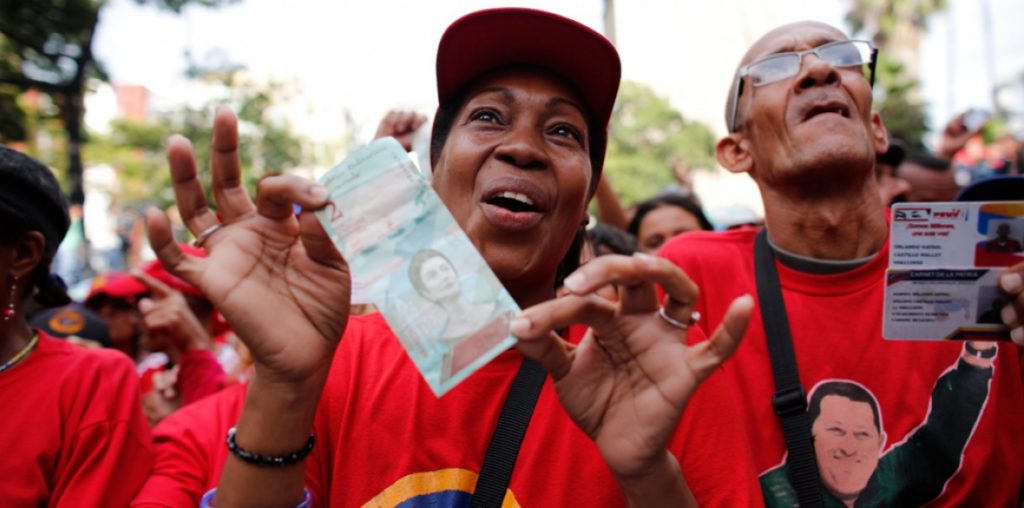By Tim Young, VSC EC
REVEALING examples are emerging of the cumulative impact that US sanctions against Venezuela are having on the Venezuelan people in the field of health, one of the key priorities of the Bolivarian revolution.
In July 2017, the US bank Citibank refused to handle Venezuela’s payment for the import of 300,000 insulin doses to meet the needs of 450,000 registered patients.
Three months later, the US blockade prevented Venezuela from depositing funds with the UBS Swiss bank, delaying a purchase of vaccines for months and disrupting the country’s vaccination schedules.
In November 2017, transnational pharmaceutical companies Baster, Abbot and Pfizer refused to issue export certificates for cancer drugs, making it impossible for Venezuela to buy them.
And in 2018, a $9 million payment through an international account for dialysis supplies for treating 15,000 patients, free of charge, was similarly blocked under threat of US sanctions.
These illustrative examples and similar ones about the blocking of food imports put the lie to the US claim that it is concerned about the well-being of the Venezuelan people.
It is clear that the US sanctions — illegal under international law — are part of an overall strategy to bring about what the US calls “regime change.”
Its aim is to undermine and topple the elected government of President Nicolas Maduro and secure control of Venezuela’s vast oil reserves and other natural resources and wealth.
In so doing it would reassert its domination over the region against the challenges to its control posed by an independent sovereign Venezuelan state committed to social justice and regional unity.
US sanctions date from April 2016 following president Barack Obama’s executive order a month earlier, permitting them on the bizarre grounds that Venezuela is a “rare and extraordinary threat to US national security and foreign policy.”
But in effect this move simply made overt what was previously an undisclosed strategy of “regime change” through destabilising Venezuela, dating back to the early years of Hugo Chavez’s presidency.
This had led George W Bush’s administration to support the failed coup d’etat against Chavez in 2002 and the right-wing management lockout in the oil industry which caused billions of dollars of lost revenue and a catastrophic impact on the government’s social projects.
Declassified US government documents and WikiLeaks material have shown that the US subsequently used covert financial, political, media and diplomatic activities in pursuit of its goal.
But with the repeated failure of US-financed efforts by Venezuela’s right-wing opposition to overthrow the government, the US seems to have decided to take a much more central role in the strategy of “regime change.” As part of this shift, the US has increased the use of unilateral illegal sanctions against Venezuela.
Following President Donald Trump’s renewal of the 2015 executive order declaring Venezuela a threat to US national security, further rounds of sanctions have been imposed against Venezuela in February 2017, May 2017, July 2017, August 2017, November 2017 and March 2018.
The most recent sanctions were imposed the day after Venezuelans voted Maduro in for a second term in the May 20 election as what can only be seen as punishment for doing so.
The effect of sanctions is far-reaching.
They interfere with international trade, blocking access to medicines as the earlier cited examples show, but also food and other essential goods. They block financial transactions, both payments and remittances, freeze Venezuela’s financial assets held externally and delay buying and selling operations, not only of the Venezuelan government and companies but also foreign business partners.
Sanctions now form a key part of what is a strategic plan by the US to ruin the Venezuelan economy, pushing the population towards mass migration or internal civil conflict and thus creating the conditions for a so-called “humanitarian intervention.”
This strategy clearly replicates draws on both the longstanding US blockade of Cuba and its destabilising of Allende’s Chile in the 1970s.
Not only has the Trump administration levied four rounds of sanctions against Venezuela less than half way through its term but, in August 2017, Trump stated he would not “rule out the military option” against the country.
Neighbouring Colombia’s recent decision to join Nato also increases US military reach and capabilities, prompting the Venezuelan government to call it “a serious threat to regional peace and stability.”
The US has also been ramping up pressure on Venezuela by internationalising its campaign of aggression. A major effort to persuade other countries, by one means or another, to join in has led Canada, the EU, Panama and even Switzerland to apply sanctions.
US courting of the so-called Lima Group of right-wing Latin American governments has further sought to isolate Venezuela diplomatically in the region.
In these circumstances, the response must be to internationalise the support for the elected government of Venezuela and defend its right to sovereignty. Solidarity is needed more than ever.
You can sign a petition against Trump’s sanctions on Venezuela at vsc.eaction.org.uk/petition/notrumpsanctions.
Originally published in The Morning Star

